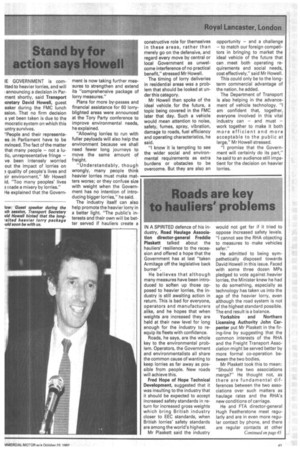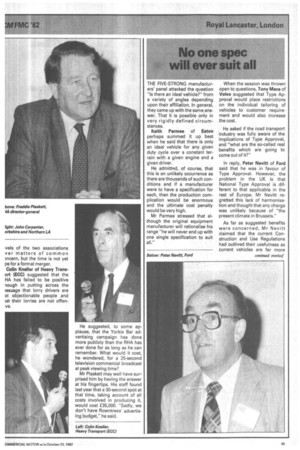IN A SPIRITED defence of his industry, Road Haulage Association
Page 29

Page 31

If you've noticed an error in this article please click here to report it so we can fix it.
director-general Freddie Plaskett talked about the hauliers' resilience to the recession and offered a hope that the Government has at last "taken Armitage off the legislative back burner".
He believes that although many measures have been introduced to soften up those opposed to heavier lorries, the industry is still awaiting action in return. This is bad for everyone, operators and manufacturers alike, and he hopes that when weights are increased they are held at their new level for long enough for the industry to reequip its fleets with confidence.
Roads, he says, are the whole key to the environmental problem. Operators, the Government and environmentalists all share the common cause of wanting to keep lorries as far away as possible from people. New roads will achieve this.
Fred Hope of Hope Technical Development, suggested that it was insulting to the industry that it should be expected to accept increased safety standards in return for increased gross weights which bring British industry closer to EEC standards, when British lorries' safety standards are among the world's highest.
Mr Plaskett said the industry would not get far if it tried to oppose increased safety levels. "I cannot see the RHA objecting to measures to make vehicles safer."
He admitted to being sympathetically disposed towards David Howell in this issue. Faced with some three dozen MPs pledged to vote against. heavier lorries, the Minister knew he had to do something, especially as technology has taken us into the age of the heavier lorry, even although the road system is not of the highest standard possible. The end result is a balance.
Yorkshire and Northern Licensing Authority John Carpenter put Mr Plaskett in the firing-line by suggesting that the common interests of the FHA and the Freight Transport Association might be served better by more formal co-operation between the two bodies.
Mr Plaskett took this to mean: "Should the two associations merge?" He thought not, as there are fundamental differences between the two associations over such matters as haulage rates and the RHA's new conditions of carriage.
He and ETA director-general Hugh Featherstone meet regularly and are in even more regular contact by phone, and there are regular contacts at other vels of the two associations ver matters of common )ncern, but the time is not yet pe for a formal merger.
Colin Kneller of Heavy Transort (ECC) suggested that the HA has failed to be positive lough in putting across the ieszage that lorry drivers are ot objectionable people and at their lorries are not offenve. He suggested, to some applause, that the Yorkie Bar advertising campaign has done more publicly than the RHA has ever done for as long as he can remember. What would it cost, he wondered, for a 25-second television commercial broadcast at peak viewing time?
Mr Plaskett may well have surprised him by having the answer at his fingertips. His staff found last year that a 30-second spot at that time, taking account of all costs involved in producing it, would cost £35,000. "Sadly, we don't have Rowntrees' advertising budget," he said.


















































































































